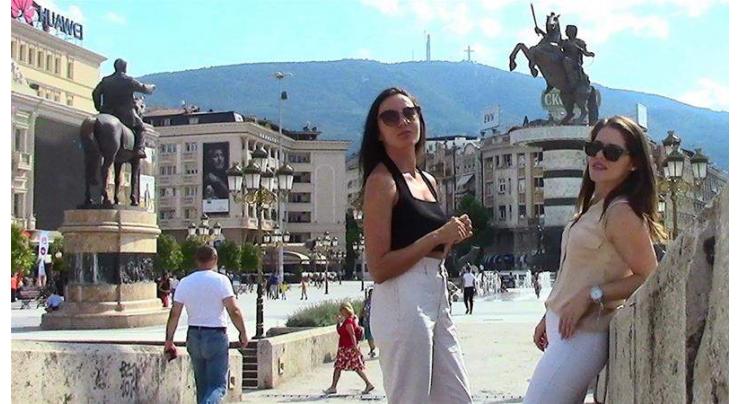
Five Things To Know About North Macedonia
Muhammad Irfan Published July 15, 2020 | 01:10 PM

Small and landlocked North Macedonia, which votes in a parliamentary election on Wednesday, made headlines when it changed its name to end a dispute with Greece last year
Skopje, Republic of North Macedonia, (APP - UrduPoint / Pakistan Point News - 15th Jul, 2020 ):Small and landlocked North Macedonia, which votes in a parliamentary election on Wednesday, made headlines when it changed its name to end a dispute with Greece last year.
Ahead of the poll, here are five things to know about the Balkan state that emerged from Yugoslavia's breakup nearly 30 years ago: - Name change - Since independence in 1991, the country has tussled over the name Macedonia with Greece, which has a province with the same name.
In 2018, the two neighbours sealed a historic deal to end their row by adding "North" to Macedonia's name in exchange for Athens promising to stop blocking its efforts to join NATO and the European Union.
The deal was applauded by Western powers but was criticized by nationalists on both sides of the border.
North Macedonia, whose name was officially changed in early 2019, was welcomed into NATO after the accord and has received a green-light to start EU membership talks, which may last years.
- Albanian minority - North Macedonia is home to around two million people, mostly Orthodox Slavs and an ethnic Albanian minority that makes up around a quarter of the population.
Passing through the northwest, a traveller might think they were in Albania.
Under a 2005 accord, residents have the right to fly the red and black Albanian flag with the two headed-eagle.
After avoiding inter-ethnic war during the bloody break-up of Yugoslavia in the 1990s, North Macedonia found itself in crisis when ethnic Albanian rebels launched an insurgency in 2001.
Up to 200 people were killed during the seven-month conflict.
The fighting was halted by the internationally-brokered Ohrid agreement in August 2001, which provided greater rights for the Albanian minority.
But many still complain of social and economic discrimination.
- Emigration - North Macedonia is one of the poorest countries in Europe, with an average salary of 420 euros ($475).
Some 16 percent of the population is unemployed, with an even higher rate among youth.
The weak economy has fuelled a large exodus abroad.
Authorities do not have official figures on emigration and have not organized a census since 2002, but according to the World Bank, about half a million North Macedonia citizens live outside the country.
- 'Capital of kitsch' - The capital Skopje has earned a reputation for kitsch after the previous government erected grandiose neo-classical statues and facades around the city, lending it a theme-park like atmosphere.
The building spree was part of the former nationalist government's battle with Greece over who can claim the heritage of historical figures like Alexander the Great.
A towering statue of the ancient king was erected in the centre of Skopje, but named "warrior on a horse" in order not to provoke Greece.
After the name accord -- known as the Prespa Agreement -- was signed with Greece in 2018, authorities put a sign on the statue and others identifying them as part of Hellenic history.
During the rapprochement, North Macedonia stripped Alexander the Great's name from its international airport and a major highway.
- Land of honey - In 2020 North Macedonia made cinematic history thanks to the success of the documentary "Honeyland".
The enchanting non-fiction film became the first to get Oscar nominations for both best documentary and best international feature.
It did not win either award, but the main character of the film, traditional beekeeper Hatidze Muratova, became a star, charming viewers with her charisma and sustainable approach to beekeeping.
"Half for me, half for the bees", she says of her honey harvest in the documentary, shot over three years by local directors Ljubo Stefanov and Tamara Kotevska.
str-ssm/dl
Related Topics
Recent Stories

Sindh home minister chairs law and order meeting

Bakht Kakar orders to ensure maximum facilities in livestock sector

NEPRA concludes hearing into FCA of DISCOs for March

Junta-led Burkina Faso suspends BBC, Voice of America for two weeks

Chairman COPHC lauds MoMA’s efforts at Gwadar Port, Free Zone

CM’s aide directs steps to prevent domestic violence against women

LESCO detects 74,621 power pilferers in 220 days

Regional Police officer (RPO) Shariq Kamal Siddiqui holds open court

LESCO collects over Rs 4.36m from 189 defaulters in 24 hours

Secretary health urges public to follow precautionary measures to avoid spreadin ..

PM directs formation of committee for consultation with provinces on carbon cred ..

UAF to ink MoU with Ethiopian universities
More Stories From World
-

Junta-led Burkina Faso suspends BBC, Voice of America for two weeks
10 minutes ago -

Romania court opens way for start of influencer Tate's trial
32 minutes ago -

Kenya flood death toll since March climbs to 70
32 minutes ago -

At least 10 people killed in Brazil fire: officials
32 minutes ago -

Russia targets Ukraine railways as Western aid due to arrive
1 hour ago -

Miner Anglo American rejects BHP's near $39-billion takeover bid
1 hour ago
-

At least 10 people killed in Brazil fire: officials
1 hour ago -

Junta-led Burkina Faso suspends BBC, Voice of America for two weeks
1 hour ago -

Saudi to host top Arab, EU diplomats for Gaza talks: officials
1 hour ago -

Kenya flood death toll since March climbs to 70: govt
1 hour ago -

US Fed's favored inflation measure accelerates in March
2 hours ago -

Kenya flood death toll since March climbs to 70: govt
2 hours ago











